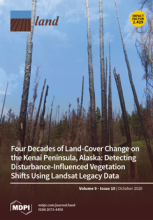Land Library
Welcome to the Land Portal Library. Explore our vast collection of open-access resources (over 74,000) including reports, journal articles, research papers, peer-reviewed publications, legal documents, videos and much more.
/ library resources
Showing items 1 through 9 of 35.Land degradation has become one of the major global environmental problems threatening human well-being. Whether degraded land can be restored has a profound effect on the achievement of the 2030 UN Sustainable Development Goals.
This study investigates the main threats related to environmental degradation that affect Amazonian Indigenous Lands (ILs). Through a cluster analysis, we group ILs according to the set of common environmental threats that occur within and outside their limits.
Planning the adaptation of agriculture and forestry landscapes to climate change remains challenging due to the need for integrating substantial amounts of information.
There is an urgent need for a global transition to sustainable and wildlife-friendly farming systems that provide social and economic equity and protect ecosystem services on which agriculture depends.
Land degradation, especially soil erosion, is a societal issue that affects vineyards worldwide, but there are no current investigations that inform specifically about soil erosion rates in Chinese vineyards.
Rapid expansion of unsustainable farming practices in upland areas of Southeast Asia threatens food security and the environment. This study assessed alternative agroforestry systems for sustainable land management and livelihood improvement in northwest Vietnam.
Knowledge transfer depends on the motivations of the target users. A case study of the intention of Indonesian coffee farmers to use a tree canopy trimming technique in pine–based agroforestry highlights path-dependency and complexity of social-ecological relationships.
Achieving change to address soil erosion has been a global yet elusive goal for decades. Efforts to implement effective solutions have often fallen short due to a lack of sustained, context-appropriate and multi-disciplinary engagement with the problem.
Nine Latin American countries plan to use silvopastoral practices—incorporating trees into grazing lands—to mitigate climate change. However, the cumulative potential of scaling up silvopastoral systems at national levels is not well quantified.




